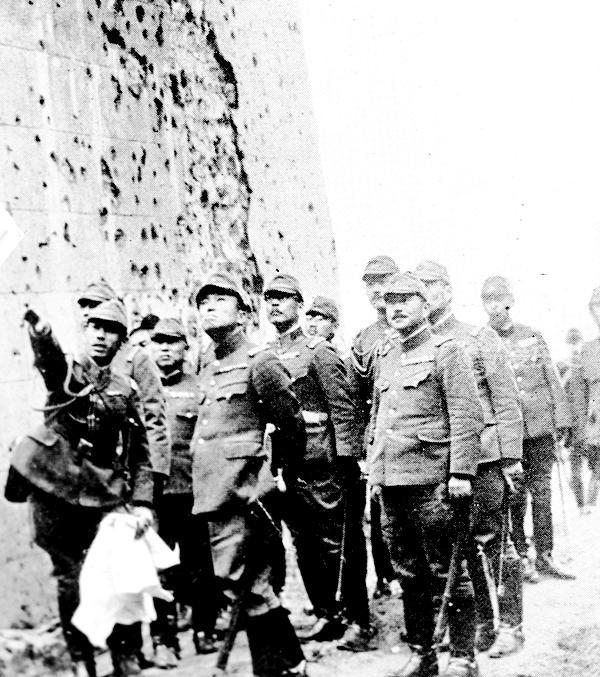In the 320th issue of the pictorial newspaper "Historical Photographs" published in May 1938 by "Love History", the Japanese army published a set of photographs under the title of "Nanjing in Recovery", in an attempt to prove through a few photos that with the occupation of the Japanese army, order in Nanjing was fully restored.

After the Japanese occupation of Nanjing, the Japanese imperial family, Emperor Showa's uncle, Lieutenant General Minoru Higashihisa Miyako, came to Nanjing to inspect. Led by the Japanese officers who occupied Nanjing, they ran to the Guanghua Gate in Nanjing, where there had been a fierce battle, to listen to the brags about how brave the Japanese army was fighting here.
The Japanese army said in the pictorial that after the occupation of Nanjing, in order to restore the order of Nanjing, a large-scale theatrical performance was held. At the scene of the performance, adults and children crowded the scene. In an attempt to prove that Nanjing was in good order under the occupation of the Japanese army, everything had been restored.
At the same time, photos of Chinese children holding five-color flags on the side of the public air defense trench in Nanjing's downtown area were published, hoping to prove through the innocent Chinese children that the traitorous puppet regime supported by Japan had won the support of the fallen people in Nanjing.
The Japanese pictorial used the foreshadowing of the above photos to draw out the main points of their propaganda. On March 28, 1938, the leader of the pseudo-"restoration government" established with the support of the Japanese army, Liang Hongzhi, a traitor who served as the puppet chief executive. This is the oath of allegiance to Japan read by the traitor Liang Hongzhi at the inaugural meeting of the puppet regime.
A traitorous key member who formed a pseudo-restoration government. Standing at the forefront were Wen Zongyao, president of the puppet court, and Liang Hongzhi, president of the puppet executive yuan.
After the establishment of the puppet restoration government, Hata Shunroku, the commander of the Japanese army in central China who planned this traitorous organization, shook hands with Liang Hongzhi and congratulated him. A group of traitors thought that by relying on the Japanese, they could henceforth rely on traitors to seek glory and soar to glory.
Liang Hongzhi also went to meet with the commander of the Japanese shanghai dispatch fleet, Hasegawa Kiyoshi. Apparently, in this photo published by the Japanese army, Hasegawa Kiyoshi treated Liang Hongzhi as a traitor with less enthusiasm than Hata Shunroku. Although Liang Hongzhi tried his best to laugh in order to cooperate with the Japanese reporter's shooting, Hasegawa Kiyoshi obviously wanted to deal with things hastily.
Why did the Japanese army spend so much time at this time to publicize Liang Hongzhi, a traitor who was originally unknown?
After the Japanese occupation of Nanjing in December 1937, the Japanese army in central China has been seeking to establish a traitorous puppet regime to replace the original Nationalist government. Their original candidates were Tang Shaoyi and Wu Peifu, former important members of the Beiyang government, who served as the president and vice president of the traitorous puppet regime. But these two Beiyang veterans did not want to become traitors in the hands of the Japanese, and refused to "go out of the mountains." For a time, the plan of the Japanese army in central China to establish a traitorous puppet regime was stuck.
Just when the Japanese army in central China could not find a suitable heavyweight to go out to the mountains to support the puppet regime, Liang Hongzhi mao voluntarily found the Japanese and expressed his willingness to serve the dogs and horses. But Liang Hongzhi was only the secretary general in Duan Qirui's government before, although we know that the secretary does not have a long, fart is not loud, but the secretary even if he carries a long weight is not enough.
Therefore, even if the Japanese army in central China could not find a suitable candidate, it was difficult for Liang Hongzhi to temporarily lead the pseudo-restoration government that was completely controlled by the Japanese, but Liang Hongzhi only served as the puppet chief executive. And the position of chairman or even president the Japanese did not want to leave it to him at all. It was only because of the time that he first let him sneak to the front desk to sing, and continue to look for the heavyweights they wanted.
When on December 29, 1938, Wang Jingwei publicly announced that Yan Dian had surrendered to the enemy, the Japanese finally found their long-desired heavyweight traitor. As Wang Jingwei stepped into the forefront, Liang Hongzhi, a puppet who was not heavy enough in the eyes of the Japanese, gradually began to stand aside.
In March 1940, after Wang Jingwei established a puppet national government in Nanjing, Liang Hongzhi's position as the puppet chief executive was also taken by Wang Jingwei, but he was only given a painless and almost idle supervision dean.
After the victory of the War of Resistance Against Japan, on June 21, 1946, Liang Hongzhi was sentenced to death for treason. On November 9, with the sound of a gunshot in Shanghai's Tilanqiao Prison, Liang Hongzhi, who was bent on selling out his country and seeking glory, completed his shameful life.